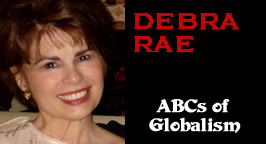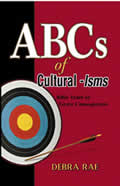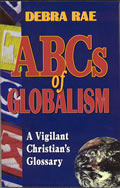TODAY'S
TACTICAL PURSUIT OF RELIGIOUS COMMONALITY
PART 3
By
Debra Rae
August 13, 2011
NewsWithViews.com
Bamboozled by Buddlam
Generally speaking, the study of cultural geography is a good thing. Ongoing dialogue allows one to learn more about others’ beliefs and cultures and hopefully fosters goodwill among world citizens.[1] Unfortunately today’s “diversity principle” is more about syncretism than it’s about education.
Beyond research, we’re called “to change our whole way of thinking” because—in the words of Millard Fuller (founder of Habitat for Humanity)—“the New Order of the Spirit is confronting and challenging us.”
An emerging “new consciousness” springs from a growing awareness among Westerners of the inherent wisdom emanating from the East. Cosmic humanist Lucile Green contends that Buddhism, Hinduism, Taoism, and Shinto may well differ, but together they portray the world as “multidimensional.” Learning through them, she continues, serves “to build the foundations of a new world order”—specifically, one distinguished by religious pluralism.[2]
Fact is postmodernists herald most any brand of spirituality that, by politically correct standards, isn’t unduly divisive.[3] For the sake of building upon “common ground”—this, in an effort to reconcile creeds that logically clash—compliant religionists (whether Christian, Hindu, Buddhist, and/or Muslim) forfeit (or feign to forfeit) traditional core doctrines of their respective religions.[4]
Buddlam’s “Path Proper”: Straight but not Narrow
Syncretistic Buddlam poses no special problem to Buddhists who historically endorse “many paths.” To the contrary, one expects Islamic fundamentalists to be more rigid. However, “pacifists” from among them readily embrace Buddhism, but for self-serving reasons. By feigning friendship with one’s nemesis, or by recasting beliefs as being somehow “similar,” these hope to gain tactical advantage. Once Islam’s taproot is sufficiently grounded, the faithful may drop any temporal façade of conciliation to summons the dar-al-kuffer to heed the call of Allah to Islam.[5]
The “straight path” to which Muslims must adhere features five pillars—the first of which is Islamic creed: “There is no God But Allah, and Muhammad is His prophet.” The next is prayer; then, charity, the observance of Ramadan by fasting, and finally an once-in-a-lifetime pilgrimage to Mecca.[6]
Buddha’s Four Noble Truths begin with suffering, caused by desire and overcome by an eightfold path of right knowledge, effort, aspiration, speech, behavior, livelihood, mindfulness, and absorption. By following eight steps of the “path proper,” Buddhists hope to curtail suffering by overcoming desire. The destination for this “path” bears not the slightest resemblance to Islam’s endpoint.[7]
Nevertheless, in the name of religious harmony, Buddlam advances and recasts a smorgasbord of mismatched creeds and practices until incongruent belief systems of Buddhism and Islam appear to be analogous when they’re not. In reality, the resulting “synchrony” is as unrecognizable and highly unlikely as a mythological half-man, half-horse (a cryptid).[8]
Creed: “No God …”
Originally recognized as Al-Lat, Allah was known to Arabs in Saudi Arabia even before Islam existed. The “moon god” was one of 360 gods worshipped by the tribes in Mecca. Ironically, strictly monotheistic Islamic creed recognizes no god but Allah. In stark contrast, Buddhism recognizes no god at all. Any pretense of reconciling these two anomalies (“no God but Allah” with “no god at all”) is purely semantic.[9]
Prayer: Prostration/Buddhist Meditation
Even as Muslims wash, prostrate themselves facing Mecca, and then pray five times daily, Buddhists similarly prostrate themselves three times before prayer. However, supposed similarities end when Buddlam presumes to equate Buddhist meditation with Islamist instruction from holy texts. Whereas the latter involves focused cognition, the former requires an altered state of consciousness. Furthermore, Buddlamists liken devotional practices that are found in many of the Sufi traditions—e.g., Whirling Dervishes—to those specifically associated with Westerners who frequent Mahayana Buddhist centers—namely, chanting, singing, and “vajra-dances.”[10]
Almsgiving: Almsgiving/Far-reaching Perfections
Both Islam and Buddhism hold individuals responsible for their actions; both adhere to strict ethics; and both practice general cleanliness and charity. As almsgiving is a pillar of Islam, all forms of Buddhism teach generosity, one of the so-called “far-reaching perfections.” While almsgiving for Muslims is motivated by compulsion, it’s pragmatism that goads Buddhists to generosity. After all, Buddhists accept that no god or gods can be counted on, not even the Buddha himself; and of ninety-nine titles attributed to Allah, “love” is not one of them.[11]
Fasting (Ramadan): Halal/Vegetarianism
Though dietary restraints attend Judeo-Christian tradition, it’s not so much what goes into the body that matters most; rather, it’s what comes out of the heart and mouth.[12] Yet again, pragmatism spurs Buddhists to vegetarianism; and, under legal compulsion, Muslims fast until sunset throughout the month of Ramadan. Additionally, while offering a prayer for animals to be reborn in heaven, Islamists follow the halal method of slaughter. Both camps refuse pork and alcohol.
Pilgrimage: Saudi Hajj/India Pilgrimage
Once in their lives, many followers of the various Buddhist traditions aspire to make a pilgrimage to the holy site in India where Buddha attained enlightenment; and Muslims make their hajj journey to Mecca. Buddhist devotees circumambulate and prostrate themselves before a prime Buddhist temple with a stone cube draped in cloth at its center. This, of course, is reminiscent of Islamists encircling the Kaaba stone in Mecca. The point being, though outward acts of piety—i.e., prayer, almsgiving, dietary restrictions, pilgrimage—may indeed suggest similitude, fundamental end goals of extinction (Buddhism) and dominance (Islam) do not.[13]
• Finally: Trivializing Essential Creed as Superfluous—e.g., Nature of God, Afterlife
The Great “No”/ Detached Nothingness
In Arabic, “lah” means "no," so it’s a negation. Buddlam toys with the word “Allah” by suggesting that the “-lah” at its end designates nothingness. Chanters who decrease one syllable of the Muslim mantra (Allahu akbar) one “lah” at a time ostensibly render Allah "the ‘Great No’"— i.e., the unimaginable pure breath of God.[14]
Keep in mind that Allah literally means “the God”—to Islamists, the only God. By tampering with the word itself, Buddlamists obliterate the very backbone of an in-your-face religion that simply won’t be refused. For the Islamist, the semblance of religious harmony is but temporal. Once the battle cry of triumph is raised, and the ummah takes form, Islamists will entertain syncretistic nonsense no longer.
Muslim Paradise/Buddhist Nirvana
Buddlamists target and, then, dismiss incompatible beliefs relating to the “afterlife” as if they were inconsequential when, fundamentally, they are not. An ultimate destination theology is no side issue. Indeed, afterlife theology dates back to ancient Egypt, and all major religions speak to it.
Whereas Muslim Paradise is portrayed as a garden full of physical pleasures, succulent fruit, and refreshing rivers (and hell is forever), Buddhists instead anticipate a state of detachment or nothingness (nirvana). Likened to one’s escaping a burning building, Buddhist samsara (“hell”) is limited.
Unless martyred, there’s no assurance a Muslim will merit reward for his good deeds, even when the good- outweigh bad- deeds committed. Arbitrary by nature, Allah makes final decisions as he pleases. In contrast, “a black substance that results from wrongdoing” (karma) is said to determine a Buddhist’s providence; and the highest (therefore, a religiously rudimentary) principle in Buddhism is known as “voidness,” said to unite everything beyond all names and concepts.[15]
As if to make a point with doctrinal spin, Buddlam equates the Buddhist principle of detachment (voidness) with the practice of circumcision among some Islamists. Pairing afterlife doctrines of Buddhists and Islamists this way serves to trivialize an essential creed. Fact is, no matter how it’s portrayed, negotiating one’s afterlife is no small matter.
In his right mind, no would-be Muslim martyr would even consider embracing extinction (voidness) in exchange for promise of seventy-two virgins in Paradise! (What man would?) Be sure, minus the spin, core beliefs of Islamic Paradise and Buddhist nirvana are conceptually different as night and day.[16]
| Subscribe to the NewsWithViews Daily News Alerts! |
Final Word
Whether presented as Chrislam, Buddlam, or Hindlam, religious syncretism guarantees global harmony and, in time, will deliver a worldwide coalition that ostensibly shares “one mind.”[17]
Though open to any non-monotheistic belief system, the complicit show ever-increasing rancor toward Bible believers who firmly “set their faces as flint” without regard for political correctness.[18] In the new order of a new age, nonconformists as these are deemed “divisive” and even dispensable.[19]
Not so in the Kingdom of Christ. They’re lauded as overcomers.[20] But not by human might or power.[21] It’s by the grace of God that these manage to escape the seduction of religious syncretism.
Click here for part -----> 1, 2, 3,
Footnotes:
1.
First developed in the late 1950s, the Delphi Technique is a psychological
process whereby a predetermined outcome is decided; and all discussions
and decisions are made to lead a group to that consensus. Collaborative
learning, conflict resolution, and Hegelian Dialectics are analogous
terms.
2.
Lucile Green. Journey to a Governed World. (Berkeley: the Uniquest Foundation,
1992): 34. Note: In Latin “religion” means “to bind”—that
is, to a belief or philosophy that might or might not involve worship
of a god or gods. Powerful incentives of guilt and/or fear beckon the
gullible to one-world dogma, as expounded in globalism’s bible,
the United Nations Charter. Not the Ten Commandments. The UNESCO Declaration
of Tolerance (1995) essentially elevates rejection of moral/religious
absolutism to the status of legal requirement in one-world politics.
3.
Called anti-logic by Plato, deconstructionism is the argument-counter
argument ploy of fifth-century sophists who applied spurious reasoning
solely to win arguments, never to establish truth. Postmodernism, or
high theory, is modern relativism applied to language. In brief, it’s
cerebral political correctness.
4.
With escalating fervency, a clarion call for religious tolerance trailed
synchronized terrorist attacks on America (11 September 2001). Thereafter,
presenting Jesus as the only way met with unprecedented disapproval.
Political correctness mandated instead an all-inclusive, milk-toast
spirituality that everyone could affirm. Goaded by the world’s
political and religious leaders, peace loving Muslims, Christians, Buddhists,
etc. linked arms as “brothers.” Living peacefully with all
men may indeed be biblical, but sharing in the hamartia (Greek, “missing
the mark with grave consequences following”) of syncretism is
not. Better for God’s people to “come out” than to
linger at the wide gate, or saunter down the broad way to destruction
(Romans 12:18; Revelation 18:3-5a; Matthew 7:13).
5.
One of Islam’s most distinguished theologians Al-Ghazzali (1058-1111)
once wrote: “Know that a lie is not wrong in itself. If a lie
is the only way of obtaining a good result, it is permissible. We must
lie when truth leads to unpleasant results.”?
6.
Huston Smith. “Buddhism” and “Islam.” The Religions
of Man. (New York: Harper and Row Publishers, 1965): 90-159; 217-253
7.
Debra Rae. “Buddhism.” ABCs of Globalism: A Vigilant Christian’s
Glossary. (Lafayette: Huntington House Publishers, 1999): 82-84.
8.
Answers.com
9.
"Allah was known to the pre-Islamic Arabs; he was one of the Meccan
deities." Encyclopedia of Islam, ed. Gibb, I:406.
10.
Sufi
Whirling
11.
William Wagner. “The Quiet Revolution.” How Islam Plans
to Change the World. (Grand Rapids: Kregel Publications, 2004): 39-42.
12.
Matthew 15:11.
13.
Mahathera, Nyanatiloka. Buddhist Dictionary: Manual of Buddhist Terms
and Doctrines, 4th ed. (Kandy, Sri Lanka: Buddhist Publication Society,
ISBN 9552400198). Available online. Retrieved July 16, 2011.
14.
Some Common Features of Islam and Buddhism: A
Conversation with Snjezana Akpinar and Alex Berzin.
15.
Glossary
of Terms and Pronunciation.
16.
Despite profound doctrinal variations, major religions share one great
teaching—namely, human beings are immortal, and their spirits
come from a divine world and eventually will return there. Since even
the earliest spiritual expressions, this stands as the singular great
hope for believers. See: Keith L. Brooks. The Spirit of Truth and the
Spirit of Error (1 John 4:6). (Chicago: Moody Press, 1969): 1-2.
17.
Revelation 17:13.
18.
In Isaiah 50:7 to set one’s face as flint (a hard rock)
denotes resolution not to shrink from suffering or contempt.
19.
John 16:2.
20.
Revelation 3:21.
21.
Zechariah 4:6.












 Share
This Article
Share
This Article







